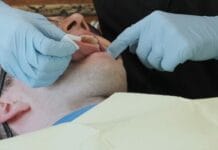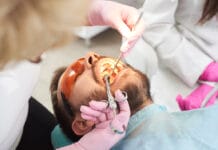I love the online dental hygiene community. I enjoy being a part of several forums and continuously find myself learning new information. In a field where many of us are the sole hygienist in an office, forums help to bring unity and ensure us that we are not alone in our struggles and triumphs.
There are times, however, when a post stops me mid-scroll. We have probably all seen a post of this nature; it often includes a radiograph with radiographic calculus along with the words “rant,” “new grad,” or “seasoned.” These posts are made with the purpose of discussing a hygienist who “never scales subgingivally,” “leaves calculus behind,” or “just doesn’t know or care what he or she is doing.” These posts typically have hundreds of comments sharing similar experiences.
Comments range from “What are they teaching new graduates?” to “Don’t they know they need to retire?”
I often read these posts and feel discouraged by my career. I have followed after new graduates and seasoned hygienists alike. I have seen patients with heavy subgingival and radiographic calculus that had “great oral hygiene” written in their chart notes from their last six-month recall. It happens. Sometimes it may have been a poorly done hygiene appointment, or maybe the patient declined their home care recommendations.
I know we can quickly point out another’s shortcomings by arguing that the calculus has been on radiographs for several recalls. But do we know without a shadow of a doubt that it is a poor hygiene visit and not poor home care?
Can we confidently say that it is a poor scaling done by a hygienist when we do not know all of the details? Was the patient late? Did the patient argue about radiographs taking up appointment time? Was the patient on their phone? Did the patient flinch every time the hygienist attempted to remove the calculus? Was the hygienist equipped with the correct instruments to remove the calculus? I know I am not the only one who experiences these hurdles when delivering care.
In a field already lacking in support from our fellow professionals and the public, why are so quick to bring each other down?
When in these situations, I try to turn the situation around. Yes, I work hard to remove all calculus, studying radiographs, using all instruments, and sometimes taking post scaling radiographs. Still, studies have shown that even the best hygienists are unable to remove all of the calculus all of the time.1 So, as hard as I am trying to do everything I can to prevent it, I am more than likely leaving calculus behind from time to time. How would I feel if I found a coworker using this to question my abilities?
Instead of focusing on the care a patient may have received from a previous clinician, what if we refocused that energy on ensuring the patient receives the best possible care we can deliver. The patient may have previously been another clinician’s patient. But when they are seated in our chair, it is our appointment, and we are in control of the care they receive. Choosing to redirect our focus to our patients ensures we deliver the best care possible.
If you are reading this, it is because you care about your patients and the care you are giving them. You are seeking more knowledge or new perspectives that will ultimately benefit your patient’s care and oral health. We should strive to deliver the best care for our patients and build our fellow hygienists up, remembering they do not call it the practice of dental hygiene for nothing. Choose to practice being kind to your fellow hygienists and focus on being the best hygienist you can be.
Now Listen to the Today’s RDH Dental Hygiene Podcast Below:
Reference
1. Kepic, T.J., O’Leary, T.J., Kafrawy, A.H. Total Calculus Removal: An Attainable Objective? Journal of Periodontology. 1990; 61(1): 16-20. Retrieved from https://aap.onlinelibrary.wiley.com/doi/abs/10.1902/jop.1990.61.1.16.












